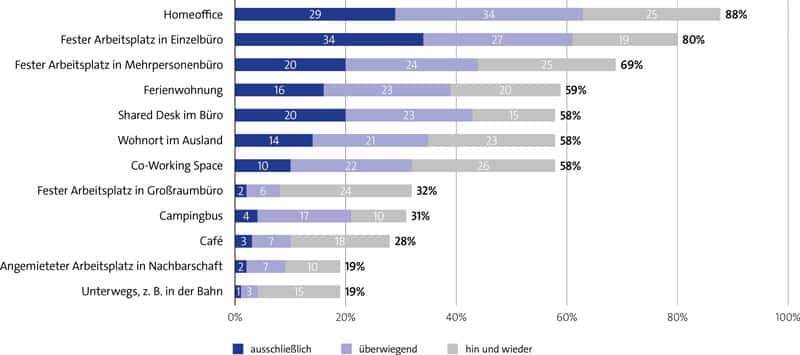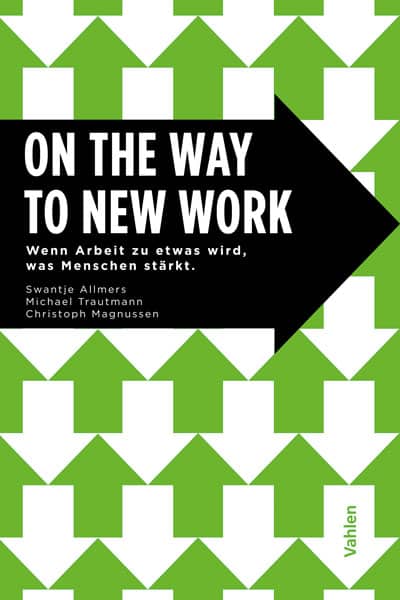Pandemic accelerates change in the world of work


Currently, half of all employees (50 percent) in Germany work fully or partially in a home office or on the move. There is great support for more flexible forms of work. The vast majority of the workforce rallies behind the values and attitudes associated with "new work: A broad range of people want to be able to freely organize their working hours (95 percent), set their own performance and learning goals (95 percent) and generally pursue meaningful work (91 percent). Employers are expected to assume social responsibility (91 percent) and to promote equality and diversity (92 percent).
Change as an opportunity
Given the choice, nine out of ten employees (88 percent) would like to work at least partly in a home office after the pandemic, while eight out of ten (80 percent) would like to work at a fixed workplace in a single office. In general, mobile working should be used much more in Germany, according to the vast majority (71 percent). More than half (56 percent) are in favor of every employee being entitled to an assessment of whether the job can also be performed on the move. These are the key findings of a representative survey of more than 1,500 employed people in Germany aged 16 and over commissioned by the digital association Bitkom. In the pandemic, the view of the digitization of the world of work has continued to develop strongly in a positive direction. More than eight out of ten employed people (84 percent) see digitization as an opportunity for their professional situation. In 2019, the figure was just 66 percent. In contrast, only one in seven (14 percent) still sees digitization as a threat to their own professional situation, much less than before the pandemic (2019: 32 percent).
The majority of employees have experience of working from home. A good quarter (27 percent) have a job that is completely suitable for home office work. A good third (35 percent) of the jobs are at least partially suitable for home office according to the respondents. In contrast, 36 percent of jobs are not suitable for home office. Currently, two-thirds of employees (65 percent) are allowed to work on a mobile basis, for example in a home office. Three quarters of them (77 percent) take advantage of this option. In terms of all employees - including those whose jobs are not suitable for mobile working - that is exactly half: 50 percent of employees in Germany currently work fully or partially on a mobile basis or in a home office.
Those who are not allowed to work on a mobile basis, even though their job would allow them to do so, are dissatisfied with this. Three out of ten (30 percent) would like to work mobile at least one day a week, two out of ten (22 percent) would like to work several days a week, and one tenth (10 percent) would like to work mobile only and no longer go into the office. The remaining third (34 percent) would want to work mobile at least occasionally. Even among those who have a job that requires them to be present, many want more flexibility. Four out of ten (44 percent) would work on the move if their job allowed it. This compares with three in ten (29 percent) who would not. A quarter of employees with presence jobs (23 percent) would like other offers such as additional vacation days or more self-determination in the creation of duty and shift schedules as compensation. 8 percent would change jobs in order to be able to work on the move.
Those who decide not to work on the move or in a home office, despite the possibility, cite technical, personal and organizational factors.
cultural reasons. A third (34 percent) have an Internet connection at home that is too slow or prone to errors. A quarter (27 percent) report a generally strong presence culture at their employer. And two in ten (22 percent) want to talk to colleagues in person at the office. If the workforce has its way, there will be a mix of mobile and face-to-face work in the post-pandemic period.
In the future, nine out of ten (88 percent) would like to work at least partly in a home office. Eight out of ten want a permanent workplace (80 percent) in a single office, seven out of ten (69 percent) a permanent workplace in a multi-person office. By contrast, only one-third (32 percent) want to work in an open-plan office, and only occasionally. More popular work locations, on the other hand, are the vacation home (59 percent), a shared desk in the office (58 percent), a permanent home abroad (58 percent) and a co-working space (58 percent). Three in ten (31 percent) would like to work from a camper. Two in ten (19 percent) prefer to work on the move, for example on the train.

Culture in transition
With the digitalization and flexibilization of the working world, the culture in the workplace is also changing. The corona pandemic has triggered a broad rethinking of leadership, collaboration and processes. Eight out of ten dependent employees (79 percent) have the impression that their employer trusts its employees more since the pandemic and is placing greater emphasis on personal responsibility. Three-quarters (74 percent) note a greater openness to digital technologies. Half (51 percent) say more attention is paid to the health and well-being of employees. Four in ten (40 percent) each report a more collaborative management style, more flexible working hours and a more relaxed dress code. One-third see more training opportunities for employees, which is a cornerstone of New Work.
Book Tip:
With their book, the authors not only want to make it clear that New Work is far more than a fashionable term. They are not concerned with table soccer and attempts to make work even more pleasant for a small group of already privileged people. New Work, new ways of working and doing business, must reach everyone, from supermarket employees to caregivers and factory workers to the CEOs of DAX-listed corporations. Because New Work also stands for the meaningfulness of our actions and a change in society.
Swantje Allmers, Michael Trautmann, Christoph Magnussen, 402 pages, 2022, ISBN: 978-3-8006-6659-1, beck.de







